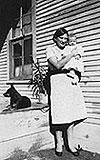 Billie was born in Stanfield, North Carolina on April 12, 1927 to Sybil Irene Rankins and Clyde
Jenkins. Billie’s unusual middle name came from a good friend of Clyde’s named Smoot
Lyles. Sybil was from Arkansas and Clyde was from Stanfield, North
Carolina. They were married in McKinney, Texas in 1926. Sybil had signed her name "Syble" on the marriage certificate and it is believed that the surname Rankins was originally Rankin a few generations back in
Ireland. Clyde owned a farm in Stanfield and was a farmer and mechanic by
trade. Clyde died in 1931, when Billie was 4, in a car accident along a country road on a dark night when he rammed his Model-T into the back of a wagon, careened off the road and went over an
embankment. The wagon had no lights on the back of it, and it is believed that Clyde was on his way home from having a few drinks with his friends at the time of the
accident.
Billie was born in Stanfield, North Carolina on April 12, 1927 to Sybil Irene Rankins and Clyde
Jenkins. Billie’s unusual middle name came from a good friend of Clyde’s named Smoot
Lyles. Sybil was from Arkansas and Clyde was from Stanfield, North
Carolina. They were married in McKinney, Texas in 1926. Sybil had signed her name "Syble" on the marriage certificate and it is believed that the surname Rankins was originally Rankin a few generations back in
Ireland. Clyde owned a farm in Stanfield and was a farmer and mechanic by
trade. Clyde died in 1931, when Billie was 4, in a car accident along a country road on a dark night when he rammed his Model-T into the back of a wagon, careened off the road and went over an
embankment. The wagon had no lights on the back of it, and it is believed that Clyde was on his way home from having a few drinks with his friends at the time of the
accident.
After Clyde’s death, the Jenkins family took the farm back from Sybil and never really acknowledged her as a part of the
family. She was left with nothing, had a small child (Billie) and was a few months pregnant with their second child at the time of Clyde’s
death. After Clyde’s funeral, Sybil returned to McKinney, Texas to be near her
family. Clyde’s brother, Temple S. Jenkins was an auto mechanic back in Stanfield and he accompanied Sybil and Billie back to
Texas. She and Temple began to see each other regularly there and were married soon afterwards back in
Stanfield. Deciding they liked Texas and living near Sybil's family, the three of them drove back to Texas
together. Settling back in McKinney, they rented one floor of a three floor
flat. The middle floor had a bathroom on it which the families living on each floor had to
share. Bill remembers an outdoor theater, where you would walk in for free at dusk, sit on the ground and watch a
movie. In 1933, Sybil, Temple and Billie (now 6 years old) moved from Texas to Washington, DC, where Temple felt it would be a better place to find a decent
job. Bill remembers stopping at roadside watermelon stands on the long drive from Texas to DC.
Temple was a gambler and not a very successful
one. At 8 years old, Bill and his mother were sent into town every weekday to sell small items door to door for money to support Temple’s gambling habit and to
survive. After school, Billie and Sybil would meet at the wholesale place, purchase their goods and streetcar passes, ride into town and sell pot cleaners, dishrags, shoelaces and razor blades door to
door. Temple, 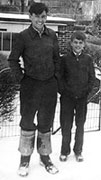 after work on payday, would religiously go down to John’s Barber Shop for "a bowl of soup", where they would get him drunk and he’d lose all his money playing
cards. On October 15, 1931, Billie’s brother, Clyde Jackson ("Jack") was
born. When Jack was old enough, he too was sent downtown to sell door to
door. If Bill and Jack had a particularly good day of selling, they would be given a nickel to hitchhike back into town and see a movie.
after work on payday, would religiously go down to John’s Barber Shop for "a bowl of soup", where they would get him drunk and he’d lose all his money playing
cards. On October 15, 1931, Billie’s brother, Clyde Jackson ("Jack") was
born. When Jack was old enough, he too was sent downtown to sell door to
door. If Bill and Jack had a particularly good day of selling, they would be given a nickel to hitchhike back into town and see a movie.
In 1935, Shirley was born, followed a few years later by Royce Clifton (RC), half-sister and brother to Billie and
Jack. Temple, Sybil and family never owned a house of their own. They rented usually the top floor of a three floor flat and they moved quite
frequently. At the time of RC’s birth, they were renting the upper floor of a three story house on Annapolis Road in
Kennelworth, Maryland. Bill, as the oldest, often had babysitting
duties. Annapolis Road later changed names to Defense Highway and that area is now a shopping mall.
At 14, Billie and his cousins Charlie (21) and Kenneth (12) set out hitchhiking to McKinney, Texas on an
adventure. Their plan was to hunt down their grandfather there and look into getting jobs as
cowboys. In Tennessee it was cold once the sun went down, but the highway pavement stayed
warm. So naturally they decided to sleep on the highway at night oblivious to the danger inherent
there. The idea was that one of them would stay awake on watch, but of course it didn’t end up that
way. One driver, after locking his brakes up to avoid running over the three of them, chased them off into the
woods. They slept in haystacks after that and one night near the railroad station they decided to snooze in an open empty rail
car. They were rudely awakened in the morning by the workers hitching up the car they were
in. By that time several other weary travelers had chosen the same car and everyone cleared out running in different directions away from the railroad workers who rousted
them. After a few weeks, they finally arrived in McKinney and attempted to find their grandfather’s address at the electric and telephone
company. They got a ride out to their grandfather’s farm on the back of a horse pulled wagon and were disappointed to find out from Gramps that it was the wrong time of year to find cow rustling
work. They stayed a few days and headed back home.
After being home for a few weeks, they decided to take another hitchhiking adventure, this time to
Georgia. They learned to sleep in bus stations to stay warm and wash up in gas station
bathrooms. One night a filling station attendant told them about a guy who owned a "cotton gin" in town, who would often allow people passing through to sleep
there. Well, that sure sounded more comfortable than a haystack or bus station bench, so they wandered down to check it
out. The owner gathered up their cigarettes and matches and bid them
goodnight. In the morning they awoke refreshed, covered with cotton fuzz, retrieved their smokes and matches and were on their way to the highway to make it to the next town.
 When Billie was 16, his stepfather talked him into quitting school to get a
job. Bill went to work for GB Mackey, a cigarette vending machine
company. His job was to travel to the various locations and refill the cigarette
machines. Temple, meanwhile, was a shop foreman at the Maryland Dairy Farm’s
garage. Later that year, Temple talked Bill into quitting his job at GB Mackey and working at the garage, a decision Bill always regretted
making. They would open the shop in the morning, get the trucks ready for delivery, repair the trucks when needed and close up shop every
night. Clyde had a fixed up an older vintage "stand-up" truck and a newer panel truck that he and Bill would use to drive home at
night. In the winter of 1943, one night after work, Temple, as usual, asked Bill to drive the older stand-up truck (a 1934 model with particularly bad tires) home in the snow, while he proceeded to go out for his night of drinking and
gambling. Bill, worrying about his safety driving standing up, took the newer panel truck home
instead. When Temple made it home later, he lashed out at Bill for that and told him to "get the hell out of the
house". Bill stormed out of the house and that was the last night he ever spent there. When Billie was 16, his stepfather talked him into quitting school to get a
job. Bill went to work for GB Mackey, a cigarette vending machine
company. His job was to travel to the various locations and refill the cigarette
machines. Temple, meanwhile, was a shop foreman at the Maryland Dairy Farm’s
garage. Later that year, Temple talked Bill into quitting his job at GB Mackey and working at the garage, a decision Bill always regretted
making. They would open the shop in the morning, get the trucks ready for delivery, repair the trucks when needed and close up shop every
night. Clyde had a fixed up an older vintage "stand-up" truck and a newer panel truck that he and Bill would use to drive home at
night. In the winter of 1943, one night after work, Temple, as usual, asked Bill to drive the older stand-up truck (a 1934 model with particularly bad tires) home in the snow, while he proceeded to go out for his night of drinking and
gambling. Bill, worrying about his safety driving standing up, took the newer panel truck home
instead. When Temple made it home later, he lashed out at Bill for that and told him to "get the hell out of the
house". Bill stormed out of the house and that was the last night he ever spent there.
Billie went to stay with his Uncle John, quitting his job at the garage and he went back to work for GB
Mackey. Uncle John charged him $10 a week rent and he became a welcome part of the family
there. Bill and his cousins Charlie and Kenneth shared a bedroom in his Uncle John and Aunt Ethyl’s three bedroom
flat. Aunt Ethyl did a lot of cooking and Bill remembers learning to eat grits there, mixed with ham grease ladled over his eggs for breakfast
. . . one of many healthy nourishing meals Ethyl would regularly whip up.
Uncle John lived in DC and the boys spent their idle time roaming the neighborhood in the southwest section of town.

In 1944, World War II was on everyone’s
mind. The news reels of the war effort stirred every young American to become involved and Billie was no
exception. At the age of 17, in early 1945, Sybil finally consented and signed the papers for Bill to join the armed
forces. Bill chose the Navy and enlisted at a local recruiting office in Washington, DC on February 5,
1945. Navy boot camp in Bainbridge, Maryland changed Bill’s life with all the rules and regulations for
everything. His clothes and gear had to be neatly rolled up and tied with clothes stops (white clothes line with metal ends) at all
times. Life became a routine of marching, drills, firearms, and discipline.
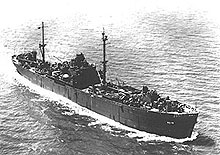 Bill’s first naval assignment was on the USS Palawan as a Seaman First
Class. The USS Palawan tour began in Norfolk, Virginia and traveled to Hawaii through the Panama
Canal. From there they traveled to Laay Gulf in the Philippines where Bill’s duties would include short stints on a mine sweeping ship with a wooden hull originating from the USS Palawan in areas of the South Pacific that were once Japanese
infested. Bill remembered the day the Japanese surrendered. They shot off rockets and flares from the boat, everyone got shore leave and there were drunken people
everywhere”. From there the USS Palawan headed north to Okinawa where the ship was damaged in a typhoon and then anchored in Sasobo Harbor,
Japan. Sasobo was devastated by the bomb in Nagasaki and apparently Bill and others from the ship got duty walking the beach to pick up ammunition from a recent battle
there. Bill’s friend walking in front of him, lost his hand picking up something that
detonated. The USS Palawan returned to Long Beach, California where she was decommissioned. Bill’s first naval assignment was on the USS Palawan as a Seaman First
Class. The USS Palawan tour began in Norfolk, Virginia and traveled to Hawaii through the Panama
Canal. From there they traveled to Laay Gulf in the Philippines where Bill’s duties would include short stints on a mine sweeping ship with a wooden hull originating from the USS Palawan in areas of the South Pacific that were once Japanese
infested. Bill remembered the day the Japanese surrendered. They shot off rockets and flares from the boat, everyone got shore leave and there were drunken people
everywhere”. From there the USS Palawan headed north to Okinawa where the ship was damaged in a typhoon and then anchored in Sasobo Harbor,
Japan. Sasobo was devastated by the bomb in Nagasaki and apparently Bill and others from the ship got duty walking the beach to pick up ammunition from a recent battle
there. Bill’s friend walking in front of him, lost his hand picking up something that
detonated. The USS Palawan returned to Long Beach, California where she was decommissioned.
In December 1946, Bill was reassigned to duty at the US Naval Station at Tongue Point in Astoria, Oregon where he was sent by train to Portland and by Oregon Stage (bus line) to
Astoria. In Astoria he worked as a Storekeeper Third Class where he handled supplies shipped to base that were redistributed to ships by
seaplanes. Bill remembered going to many keg parties on the beach with bonfires with Navy
friends. One night he met Patricia Turpeinen, both coming to that beach party with
dates. They would later get together and dated regularly, “going steady” for a couple of years.
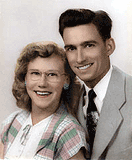 In late 1950, Bill was assigned to ship out on the USS
Sanborn. He and Pat decided to get married shortly after learning about his
reassignment. One morning they took the ferry across the Columbia River from Oregon to Washington where there was less wait time to
marry. In Ilwaco, Washington while knocking on the Justice of the Peace’s door, a minister drove by, realized their predicament and asked if they wanted to get married in his
church. They of course agreed and were married in a quick ceremony. Afterwards a reception was held at Pat’s cousin Leila’s
house. For their honeymoon they drove north to Vancouver, British Columbia and spent a few days
there. Back in Astoria, they found an attic apartment together which had a shower in the
basement. The place was wide open with no walls or drapes on the
windows. They had lots of friends that would come over and drink beer and they ended up getting kicked out because of all the parties and toilet flushing going on in the attic
apartment. Bill’s assignment on the USS Sanborn included a 6 month tour of duty to the Caribbean with ports of call in
St. Thomas and Jamaica and the east coast of the United States. In late 1950, Bill was assigned to ship out on the USS
Sanborn. He and Pat decided to get married shortly after learning about his
reassignment. One morning they took the ferry across the Columbia River from Oregon to Washington where there was less wait time to
marry. In Ilwaco, Washington while knocking on the Justice of the Peace’s door, a minister drove by, realized their predicament and asked if they wanted to get married in his
church. They of course agreed and were married in a quick ceremony. Afterwards a reception was held at Pat’s cousin Leila’s
house. For their honeymoon they drove north to Vancouver, British Columbia and spent a few days
there. Back in Astoria, they found an attic apartment together which had a shower in the
basement. The place was wide open with no walls or drapes on the
windows. They had lots of friends that would come over and drink beer and they ended up getting kicked out because of all the parties and toilet flushing going on in the attic
apartment. Bill’s assignment on the USS Sanborn included a 6 month tour of duty to the Caribbean with ports of call in
St. Thomas and Jamaica and the east coast of the United States.
After returning from his tour on the USS Sanborn, Bill was assigned to the Naval Base in Stockton, California where he helped coordinate
APA transport ship transportation of CBs (construction battalions), Marines and smaller vehicles
overseas. Pat moved from Astoria to Stockton where she and Bill lived in a half quanset, all they could afford on the $77.10 per month allowance the Navy compensated you for rent when stateside.
In May 1952, Bill was assigned to the USS Oakhill with Pat 4 months pregnant with their first
child. The USS Oakhill stationed in Norfolk, Virginia was deployed to Enewetak Atoll, Marshall Islands in the South Pacific near where the H-bomb tests were being
performed. The H-bomb is said to have had 100 times the destructive force of the Atom bomb dropped on Hiroshima near the end of
WWII. When the H-bomb test detonation was performed on Bikini Island, Bill and his fellow shipmates docked in Enewetak were told to stand behind a bulkhead and to shield their eyes with their
arms. He remembered still seeing a very bright light with his eyes closed and arms shielding
them. While on tour, Temple (Bill’s stepfather) called Pat and invited her to visit them in Tuxedo,
Maryland. She made the trip, visiting them several times flying back east and eventually moving out to Norfolk awaiting the end of Bill’s
assignment. Bill’s USS Oakhill tour lasted 8 months during which Pat gave birth to Holly on October 4, 1952 at Bethesda Naval
Hospital. Bill wouldn’t see his new daughter until she was 4 months old.
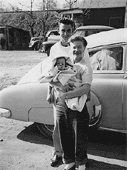 Returning from the Marshall Islands to Norfolk, Virginia to his new family in February 1953, Bill was put in charge of “Stores” at the Naval base
there. Bill and Pat bought their first TV (a black and white Zenith) and a 1950 white Chevrolet
sedan. After 3 months stateside, he was then assigned to the USS White Marsh which deployed to Greenland to clear rocks and level an area for a US airfield
there. On that tour of duty the USS White Marsh caught the lower edge of an iceberg putting a 60 foot hole in the starboard
bough. They welded on a coffer dam and headed quickly back to a shipyard in Baltimore, Maryland for
repairs. Before arriving in Baltimore, Bill transferred to the USS Camden for a quick trip to
Casablanca. He remembered passing the Rock of Gibraltar and the shore leaves and bars in Barcelona, Spain and Cypress
Island. When Bill returned to Norfolk, Virginia, he decided to leave the Navy in November,
1953. Returning from the Marshall Islands to Norfolk, Virginia to his new family in February 1953, Bill was put in charge of “Stores” at the Naval base
there. Bill and Pat bought their first TV (a black and white Zenith) and a 1950 white Chevrolet
sedan. After 3 months stateside, he was then assigned to the USS White Marsh which deployed to Greenland to clear rocks and level an area for a US airfield
there. On that tour of duty the USS White Marsh caught the lower edge of an iceberg putting a 60 foot hole in the starboard
bough. They welded on a coffer dam and headed quickly back to a shipyard in Baltimore, Maryland for
repairs. Before arriving in Baltimore, Bill transferred to the USS Camden for a quick trip to
Casablanca. He remembered passing the Rock of Gibraltar and the shore leaves and bars in Barcelona, Spain and Cypress
Island. When Bill returned to Norfolk, Virginia, he decided to leave the Navy in November,
1953.
Bill, Pat and Holly drove to Bill’s parents place in Tuxedo, Maryland and stayed with them while Bill tried to settle into civilian life and get a
job. He worked for a grocery store for a short stint and then found a job driving a truck for a handicapped man with a nursery in Boston, Massachusetts transporting vegetables to grocery
stores. Pat and the kids drove up where they rented a third floor flat.
They traded in the 1950 Chevy for a 1954 Chevrolet Bel Air and took out a 3 year loan for the
remainder. They took many weekend trips to Maine, Vermont and New Hampshire.
Bill was never very happy with his job, so civilian life only lasted about 6
months. He re-enlisted with the Navy in 1954 losing a stripe in the
process. He was processed through a receiving station in Anacosta, Maryland and transferred to Charlestown, Massachusetts where he took a position assembling supplies for a supertanker being built in a shipyard there and keeping records of all the
transactions. They packed up their belongings and Pat and his buddie’s wife drove to Norfolk and rented a duplex together in Little Creek, Virginia, a beach area close to the amphibious base where Bill was
assigned. The supertanker was commissioned in 1955 and Bill remembered a big celebration at the shipyard when she left dock.
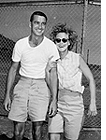
The USS Neosho, a tanker docked in Norfolk, was Bill’s next
assignment. The ships agenda included retrofitting carriers and destroyers that were stationed in
Europe. The USS Neosho toured England, France and many ports in the
Mediterranean. In 1957, Bill was stationed at Guantanamo Bay, Cuba, where he served in Fleet Training as a drivers license examiner giving navy personnel written and road tests so they had a license to drive on the
base. He also worked in the supply department and as an inspector in the print
shop. Pat flew over to join him in the base military housing and bided her time raising Holly, taking golf lessons and bowling in league with some of the other Navy wives.
Bill was reassigned to the Bremerton, Washington Naval Station in
1960. They flew back from Cuba back to Norfolk and drove to Bremerton by car with Pat expecting their second
child. Bill Jr. was born shortly after their arrival in Bremerton on March 24,1960 at Bremerton Naval
Hospital. Bill was promoted to Chief and worked with the Pacific Reserve Fleet
there. They bought a mobile home and settled into life at the Brentwood Trailer Park and Washington
state.
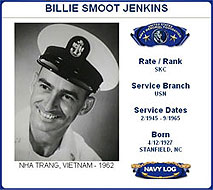
In January 1962, Bill received orders to go to Midway which were cancelled enroute and he was reassigned to
Vietnam. In Nah Trang, wearing civilian clothes, he served as an advisor, writing up curriculums and lesson plans for Vietnamese teachers, serving in a support
position. One of his first nights in Nah Trang, Bill was making a big commotion in the middle of the night in their sleeping quarters yelling for the house boy to bring him some toilet
paper. Ralph Brown, a fellow officer, walked down the hallway and threw him a roll hitting him in the head and telling him to quiet down so everyone could get some
sleep. Ralph would end up being a lifelong friend of Bill. Towards the end of their stay, Bill was sent to Saigon to stock up a ships store for their return trip.
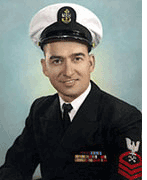 Bill’s term in Vietnam ended when he was given 30 days leave and then ordered to the USS Gregory, a destroyer based in
California. The family moved along with this assignment to the USS Gregory’s home port in Chula Vista, California (near San
Diego). The USS Gregory made a quick goodwill trip to Vancouver, B. C. and then settled into performing military maneuvers and anti-submarine exercises at night where Bill served on the
bridge. While on the USS Gregory performing night maneuvers, the USS McDermott collided with them and both ships were taken back to Long Beach, California for
decommissioning. While in Long Beach, Bill would visit his friend Ralph, who retired and went to work in the Naval Shipyard
there. Pat and the kids moved the trailer down to San Diego when Bill’s USS Gregory tour
ended. Nora, Bill and Pat’s third child, was born in Balboa Naval Hospital in San Diego on November 12, 1963. Bill’s term in Vietnam ended when he was given 30 days leave and then ordered to the USS Gregory, a destroyer based in
California. The family moved along with this assignment to the USS Gregory’s home port in Chula Vista, California (near San
Diego). The USS Gregory made a quick goodwill trip to Vancouver, B. C. and then settled into performing military maneuvers and anti-submarine exercises at night where Bill served on the
bridge. While on the USS Gregory performing night maneuvers, the USS McDermott collided with them and both ships were taken back to Long Beach, California for
decommissioning. While in Long Beach, Bill would visit his friend Ralph, who retired and went to work in the Naval Shipyard
there. Pat and the kids moved the trailer down to San Diego when Bill’s USS Gregory tour
ended. Nora, Bill and Pat’s third child, was born in Balboa Naval Hospital in San Diego on November 12, 1963.
In February 1964, Bill was transferred to another destroyer, the USS Warden, assigned to tour the South China Seas as an escort for a Carrier group which held a lead position in the guided missile program, essentially acting as a shield in case of submarine
attack. Hong Kong was one of their ports of call. The USS Warden would be Bill’s last tour of
duty. The Navy processed him to civilian life through the receiving station in San
Diego. While waiting for his release papers, he was asked to be a guard at the Exchange checking people’s sales slips for a few
days. Bill retired from the Navy on September 9, 1965 with 20 years of service in at the rank of Storekeeper Chief
(SKC).
Bill, Pat and the kids all drove up to Bremerton together the following day and stayed with friends for a couple of
days. The Navy had their mobile home towed to the Rocky Point Trailer Park and Bill and Pat settled into civilian life for only the second time in 15 years since their
marriage. Bill went to the unemployment office and began looking for a job applying at the Post Office, the shipyard and a few other places over the next few
weeks. There was a 6 month waiting list to get a job at the Puget Sound Naval Shipyard where many retired Navy men would seek
employment. The shipyard finally called Bill in March, 1966, offered him a job for $1. 70/hr as a driller in the structural group and trained him to be a ship
fitter. As fate would have it, the Post Office called him shortly after he hired in at the
shipyard. On his 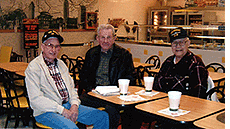 first day working at the Puget Sound Naval Shipyard, he ran into Ralph Brown who had transferred there from the Long Beach
Shipyard. Bill and Ralph would meet at the Commissary periodically on Saturday morning for coffee and to do their grocery shopping for the
week. After Bill retired from the shipyard this Saturday tradition would be a regular occurrence and would continue for the next 21
years. Bob O’Neill, a shipyard police sergeant, began joining them in
1982. Ralph called them the “3 old grouches” and said they got together each Saturday morning for an hour of telling old sea stories of all their Navy adventures.
first day working at the Puget Sound Naval Shipyard, he ran into Ralph Brown who had transferred there from the Long Beach
Shipyard. Bill and Ralph would meet at the Commissary periodically on Saturday morning for coffee and to do their grocery shopping for the
week. After Bill retired from the shipyard this Saturday tradition would be a regular occurrence and would continue for the next 21
years. Bob O’Neill, a shipyard police sergeant, began joining them in
1982. Ralph called them the “3 old grouches” and said they got together each Saturday morning for an hour of telling old sea stories of all their Navy adventures.
Pat began having some problems with her equilibrium and was diagnosed with Multiple Sclerosis in May
1968. As her illness progressed, she went from walking with a cane, to a walker and finally a wheelchair in 1973 where her MS seemed to finally arrest
itself. Bill and the family adapted to her condition and tried their best to lead a normal family
life. They spent summer weekends camping in western Washington and around the Olympia peninsula near the ocean, often at Fort Stevens in Astoria to be around Pat’s family and the place she and Bill had their earlier good
times. They took vacations to southern California to visit Bill’s brother Jack and his wife Jeannie and to Maryland several times to visit his sister Shirley, her husband Pete, their kids and his mother Sybil (living with Pete and Shirley at the time).
In 1968, Bill bought a small piece of property on Lake Tahuya (near
Bremerton). A few years later they bought a Ford truck with a camper. They would take many weekend getaways to Lake Tahuya, staying in their camper and go swimming and
relax. Bill bought a boat and they went fishing and “cruising” in the boat around the Puget
Sound. Bill got into motorcycles starting out with a Honda 350 gradually working his way up to a fully dressed Harley Davidson 1200 over a number of
years. He would go for day rides with friends and joined a motorcycle
club. Nora remembers accompanying him on some of the motorcycle club rides.
All this time, Bill continued to work at the Puget Sound Naval
Shipyard. He had planned to retire from the shipyard at 55 to take advantage of the better pension benefits you get working for the government until that
age. He worked an extra year beyond that with Nora in college at the University of Washington and some of the financial burdens associated with
that. He retired from the shipyard in June, 1983 with 17 years in there and 37 years total working for the government.
After 6 months of retirement, Bill began to get
bored. He had painted the house, fixed up the yard and was running out of chores, so he and his friends began to meet to hit a bucket of balls at the local golf
course. Nora had a friend whose mother, Joann Fijalka, was office manager at the Rolling Hills Golf
Course. Joann mentioned to Nora that they were looking to hire in another person at the pro shop
there. Nora said that her father might be interested in that and that lead to Bill’s “retirement job” which he intended to do only for a few
years. Bill then picked up the game of golf, golfing every day with fellow co-workers, working in the pro shop, and he found a new love in the sport.
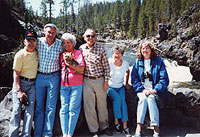 In the 1990s with the children out of the house, Bill and Pat would take several cross country trips in the
van. They drove to Maryland to visit Pete and Shirley again and toured Washington, DC and Bill’s old childhood haunts
there. They motored to the Bay area in California to visit Jack and Jeannie and see San Francisco, San Jose and all the sights
there. In May 1992, they met Jack and Jeannie and a couple of their friends at Yellowstone National Park and the Grand Tetons for a
week. They made an annual trip down to Astoria and long Sunday morning drives became a ritual on
weekends. Bill’s devotion to Pat and taking care of her was the center of his life now.
In the 1990s with the children out of the house, Bill and Pat would take several cross country trips in the
van. They drove to Maryland to visit Pete and Shirley again and toured Washington, DC and Bill’s old childhood haunts
there. They motored to the Bay area in California to visit Jack and Jeannie and see San Francisco, San Jose and all the sights
there. In May 1992, they met Jack and Jeannie and a couple of their friends at Yellowstone National Park and the Grand Tetons for a
week. They made an annual trip down to Astoria and long Sunday morning drives became a ritual on
weekends. Bill’s devotion to Pat and taking care of her was the center of his life now.
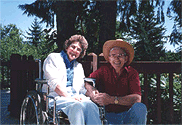 In late 1996, Pat’s Multiple Sclerosis kicked back in after 27 years of lying
dormant. Over the course of a year Pat progressively got worse, eventually resulting in a stroke that hospitalized
her. Most of this biography was the direct result of time spent at Bremerton Naval Hospital with Bill, Nora, Holly, Dan, Ralph, Pat’s sister Kathleen, myself (Alan) and others waiting to see if Pat would pull out of her
coma. She never did recover and passed away on October 24, 1997. Bill visited her at the cemetery after that almost every day, so often that he struck up a friendship with one of the groundskeepers there. In late 1996, Pat’s Multiple Sclerosis kicked back in after 27 years of lying
dormant. Over the course of a year Pat progressively got worse, eventually resulting in a stroke that hospitalized
her. Most of this biography was the direct result of time spent at Bremerton Naval Hospital with Bill, Nora, Holly, Dan, Ralph, Pat’s sister Kathleen, myself (Alan) and others waiting to see if Pat would pull out of her
coma. She never did recover and passed away on October 24, 1997. Bill visited her at the cemetery after that almost every day, so often that he struck up a friendship with one of the groundskeepers there.
Bill had to now adapt to living alone, spending a lot of time with Holly and Dan, Nora and Alan, Grandma Mary, all his grandkids, great grandkids and
friends. His Navy background stayed with him his entire life and his life was very regimented, it was one of his quirks and most endearing
traits. He got up at 5:30am each morning, had breakfast and coffee at McDonalds, most often golfed a round at Rolling Hills, having lunch at 11am, an afternoon nap and dinner at
4:30pm. He’d read the morning paper every night in bed, most evenings calling Nora at 10pm to talk about his day and wish her goodnight, and went to sleep at
11pm. He visited Grandma Mary several times a week, bringing her cookies and keeping her company while watching over the great grandkids, had dinner regularly with Holly and Dan, cake and coffee with Ralph and Jean, and twice a month polished his red Toyota
truck. He talked to Pete and Shirley, Jack and Jeannie and other family
often. He left early for everything he did, making sure he had extra “flat tire
time”. Bill never waivered from his Saturday morning coffee and commissary shopping routine with Ralph and Bob except when he or they were out of
town. Bill continued to work part-time at Rolling Hills Golf Course until last year (Fall 2004) when he retired again at age 77 with 21 years in the pro shop there.
Bill passed away on Wednesday afternoon August 10, 2005 peacefully during his afternoon
nap. He appeared to be in good health, so it was very unexpected. He will be missed by everyone that knew him and will continue to live on in our memories.
|
|



